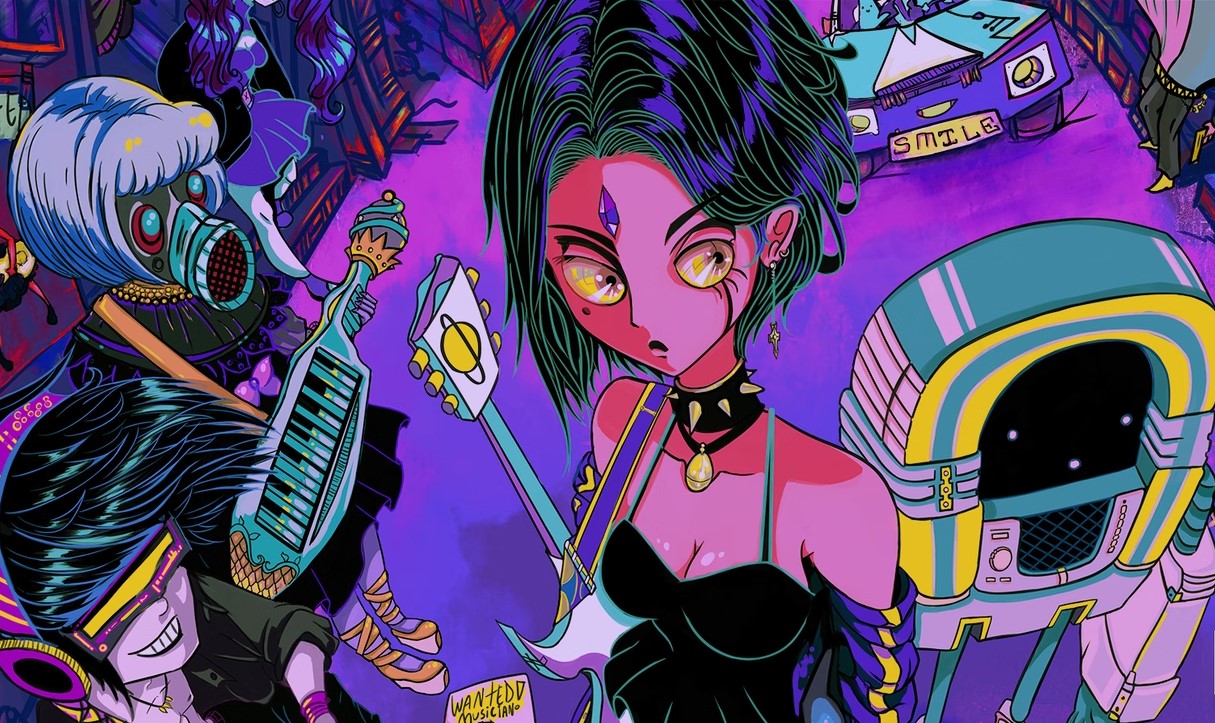It's about time someone made a musical RPG that puts the 'punk' in cyberpunk
Keylocker puts you in a future where music is outlawed, hands you a guitar, and says: you know what to do.

Keylocker is a Brazilian indie RPG that poses a brain-scrambling question: what if Daft Punk hadn't just been the composers of Tron Legacy's incredible soundtrack—what if they'd been the protagonists, too?
That… would have been better, right? I have a soft spot for Tron Legacy thanks to its slick reimagining of that '80s inside-the-computer aesthetic—and Jeff Bridges saying "bio-digital jazz, man"—but you have to admit the whole flick would've been improved by explicitly weaving that incredible soundtrack into the story. It took me about three seconds to nod an emphatic yes to Keylocker's premise: you play a punk rock character on a futuristic Saturn colony where music has been outlawed, so naturally you use a guitar to rebel and mess shit up.
It's been a dry decade for stories that take place inside computers. We keep playing games on our computers, but it's just not the same. Now 2023 is shaping up to be a banger, thanks to Keylocker and Capcom's revival of Mega Man Battle Network, which feel like flip sides of the same aesthetic. If Battle Network is a bit cyberpunk by way of Kidz Bop, Keylocker is more cyberpunk by way of the Hotline Miami soundtrack.
The demo, which I played at Brazil's international game festival (though it's also available on Steam) had me breaking out of a prison where I'd been locked up for music crimes, using rhythm game-like inputs to trigger actions in battle. I'm fibbing with my premise a little here because it's not technically set inside a digital computer world like MMBN or Tron, but the aesthetic is a near-perfect match. I guess futuristic Saturn prisons are more or less indistinguishable from computer worlds.
According to the story synopsis on Steam, the main thrust of Keylocker's musical rebellion story is protagonist B0B0 looking for a drummer. But you know how it is when your authoritarian society has completely banned music and thrown you in jail: you can't exactly go around putting up band flyers. It's a funny twist on the usual JRPG save the world plot that I hope speaks to an abundance of personality throughout Keylocker.
I didn't get to see much of that story—I spent my 40 minutes or so mostly getting to grips with the combat system, which isn't immediately intuitive. The turn-based battles take place on a grid (so attack range factors in) and the system is clearly riffing on the Mario RPGs with timing-based attacks and blocks. Tap a button when you're about to land a hit to deal more damage, or tap when an enemy's about to hit you to negate a good chunk of it. I found the timing tough: in some cases I felt like I needed a better sense of when to tap for my own attacks, but I also liked that enemy attack animations were varied and challenging to 'read.'
In addition to a health gauge, each character has an electric gauge, which I would fill by pulling out my guitar and shredding on a quick rhythm game-esque sequence of button commands. The electric gauge doubles as a shield to absorb certain attacks and a meter to power up attacks. It's not immediately clear how best to use it, and Keylocker's demo is a bit too light on the tutorializing, but I did start to get a feel for what I was doing after half a dozen fights. I could drain the bar to charge up a killer guitar slam, but doing that left my life gauge open to the next hit.
The biggest gaming news, reviews and hardware deals
Keep up to date with the most important stories and the best deals, as picked by the PC Gamer team.
Even if Keylocker ends up being relatively short by RPG standards, I barely got started—my demo time ended before I'd even broken out of jail. What I played still needed some polish; battles could be snappier, and the prison's environmental sound effects are so effectively grating that I really did not want to spend any more time listening to them. But it's likely still a year away from release, enough time to work on those things.
I hope it lives up to the premise, because this sci-fi rock-band-defeats-fascism plot just feels very right for this moment in time.
I'm glad to live in the era of indie RPG developers iterating on the systems of games they grew up with. Some lean too heavily on their inspirations, but Keylocker clearly has its own style and is remixing some old ideas into something new. Even the opening had me curious—you can pick between three character classes, which not only affect your attacks but take you down branching story paths. It was exciting knowing from the jump that my decision carried real weight.
And at the very least, I'm psyched to see a cyberpunk game that fully embraces actually being punk.

Wes has been covering games and hardware for more than 10 years, first at tech sites like The Wirecutter and Tested before joining the PC Gamer team in 2014. Wes plays a little bit of everything, but he'll always jump at the chance to cover emulation and Japanese games.
When he's not obsessively optimizing and re-optimizing a tangle of conveyor belts in Satisfactory (it's really becoming a problem), he's probably playing a 20-year-old Final Fantasy or some opaque ASCII roguelike. With a focus on writing and editing features, he seeks out personal stories and in-depth histories from the corners of PC gaming and its niche communities. 50% pizza by volume (deep dish, to be specific).

